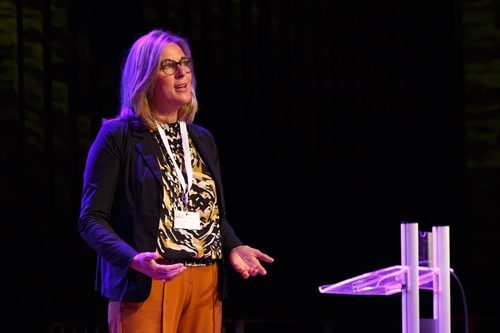Marker Wadden are an icon of the Building with Nature philosophy
Katja Portegies, Director of Water and Safety at Rijkswaterstaat, already had the opportunity to visit Marker Wadden twice. The natural islands have been constructed with excess sediment from the Markermeer. 'It’s a wonderful place to experience nature, especially because there are almost no buildings. Birds are all around and life above and below water started to flourish in no time," she says.
But apart from the great natural value, Portegies sees the islands as the result of a special collaboration. 'It shows that, together with knowledge and market parties, we are able to come up with solutions for the major challenges of our time.'
Building with Nature
By this she means, for example, water safety and nature conservation, which are increasingly under pressure due to climate change. According to the chairman of the steering committee KIMA (Knowledge and innovation program Marker Wadden), this requires integrated solutions. Such as Marker Wadden, where water quality, natural values and recreation come together.
'That is why Marker Wadden are an icon of Building with Nature thinking for me. We need this creative approach to deal with the effects of climate change worldwide. Don't just see it as a threat, but think in terms of opportunities and tackle challenges in the field of water and nature together.'
Directly apply knowledge
According to Portegies, the project could only get off the ground by joining forces between knowledge, market and research parties. 'The common denominator was that everyone believed in this approach to tackle the complex challenges in the Markermeer area,' she emphasizes.
At the same time, Marker Wadden is a major innovation project in which research and monitoring via KIMA have an important place. 'Usually, implementation is central and no room has been made for knowledge development. We are now acquiring knowledge that can be applied much more quickly. For example in the construction of new islands, but also in other projects.'
[text continues below picture]

Programmatic Approach large Waters Water Bodies
We would like to integrate knowledge development in a similar way in future projects, especially now that water management issues are increasingly being tackled in large-scale programs.
'Within the Programmatic Approach for Large Waters (Programmatische aanpak grote wateren, PAGW), many projects are running simultaneously. That is why it is valuable to be able to exchange knowledge directly. With this approach you take knowledge with you to subsequent projects and you really build on something. Also, this makes it much more interesting for knowledge and market parties to invest in research and monitoring.'
International conference Marker Wadden Knowledge and Innovation Program
The KIMA congress from 12 to 14 October 2022 sees Portegies as the moment to share the experiences and knowledge gained with the international community. At the same time, she is curious about new insights from other projects worldwide. 'I hope that valuable connections will be made and that Building with Nature will be placed higher on the agenda. I would also like it if new research ideas for Marker Wadden were generated.'
Partners Knowledge and Innovation Program Marker Wadden
The Marker Wadden Knowledge and Innovation Program is an initiative of Rijkswaterstaat, Deltares and Natuurmonumenten.
Harm Duel, head of water resources and delta management, Deltares: 'The intensive collaboration between governments, knowledge institutions, market parties and social organizations makes research on Marker Wadden unique. An example for future large-scale projects aimed at increasing the resilience of areas and large bodies of water to climate change. Both in the Netherlands and internationally.'
'We hope that implementation and knowledge development will continue to go hand in hand in the future.'
Roel Posthoorn, project director Marker Wadden (Natuurmonumenten): 'The research program is also very important for an NGO like Natuurmonumenten. It provides answers to important knowledge and management questions. The lessons learned help us with the current management and to implement a possible next step of Marker Wadden even better and more effectively. We hope that implementation and knowledge development will continue to go hand in hand in the future.'